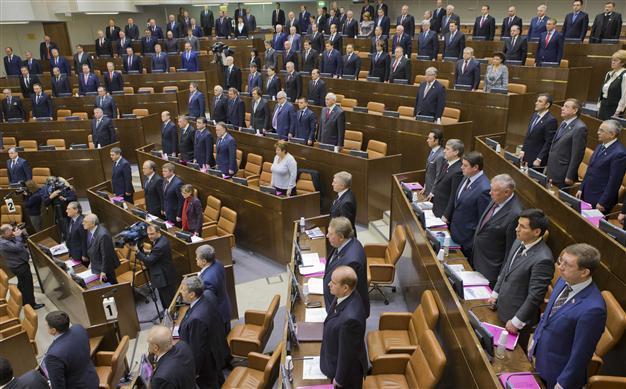Russia ban on US adoption clears parliament
MOSCOW - Agence France-Presse

Federation Council members listen to national anthem at a session opening in the Russian parliament's upper chamber in Moscow, Russia, Wednesday, Dec. 26, 2012. AP photo
Russia's upper house of parliament on Wednesday backed a bill barring Americans from adopting Russian children by a unanimous vote, leaving the controversial measure in the hands of President Vladimir Putin.The rubber-stamp hearing cleared the last legislative hurdle for a bill representing one of the toughest pieces of anti-US legislation to emerge during Putin's 13 years in charge.
The Russian strongman has expressed understanding for the measure -- drafted in retaliation for a new law sanctioning Russian officials implicated in the prison death of lawyer Sergei Magnitsky in 2009 -- without explicitly vowing to sign it.
The bill has already passed the three required readings in the State Duma lower house despite protests from rights advocates and even the foreign ministry.
Russian actor Konstantin Khabensky underlined the unease in Russia about the law by appearing next to Putin during an annual Kremlin awards ceremony wearing a button reading "Keep children outside politics." The ceremony occurred moments before the Federation Council -- comprised exclusively of Putin allies and ruling party members -- passed the measure in a 143-0 vote taken after speakers took turns decrying US policies towards Russia.
"I believe that any foreign adoption is detrimental to our country," children's rights commissioner Pavel Astakhov said after the vote.
"A country as great as Russia should not be selling its children," said Astakhov.
The bill also includes a provision forbidding Russian political organisations from receiving US funding.
"It is now clear that Putin intends to sign this," said veteran Russian human rights campaigner Lev Ponomaryov. "This reminds me of Soviet times." The White House said it intended to raise concerns with both parts of the legislation at future meetings with Russian officials.
"Children should have every opportunity to grow up in loving families," US President Barack Obama's national security staff said in a statement.
"Their fate should not be linked to unrelated political considerations." Moscow's pointman on US relations conceded that Wednesday's vote was likely to add to difficulties that have emerged since Putin's return to a third term at the Kremlin in May.
"This weight, this ballast will act as a drag on our relations. There is no doubt about that," Interfax quoted Deputy Foreign Minister Sergei Ryabkov as saying.
"The backdrop (to our relations) is very bad," he said. "With everything that has been happening, the backdrop going into the new year is very bad." The legislation came up this month after Obama signed into law the so-called Magnitsky Act -- a measure paying tribute to a Russian lawyer who died in custody after exposing a $235 million police embezzlement scheme. The law blacklists dozens of Russian officials allegedly involved in his death and freezes their assets in the United States.
Magnitsky's employer Hermitage Capital -- once Russia's largest Western investment fund -- and family both believe the 37-year-old was tortured to death.
But Russian prosecutors this week moved to drop charges against the only person on trial in the case.
The Russian lawmakers' response has agitated cabinet members such Foreign Minister Sergei Lavrov. The deputy prime minister in charge of social affairs Olga Golodets also wrote a letter to Putin voicing her strong objections.
And Putin's own human rights council condemned the draft on Tuesday as potentially unconstitutional.
The Russian leader now has two weeks in which to sign the legislation.
The United States remains the number one foreign destination for orphans in Russia -- a country that since Soviet times has relied on state-run homes for children and has a weak tradition of adoptions.
A total of 956 Russian children travelled to the United States last year to be adopted out of the 3,400 who found families abroad. Russians recorded 7,400 adoptions in the same period.
Children's rights ombudsman Astakhov said that 46 children whose US cases are pending would not be able to travel to their new homes if the measure comes into law on January 1.
"These children will be given priority assignment for adoption by Russian families," he said.
















